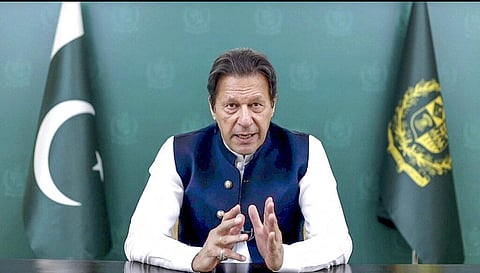

ISLAMABAD: In a dramatic move, Pakistan's Opposition approved a 'no-confidence motion' against Prime Minister Imran Khan in its 'own session' of Parliament after it was dissolved by President Arif Alvi, and declared that the no-trust motion was "successful" with nearly 200 votes.
The result of the 'vote' was announced by Pakistan Muslim League (Nawaz) leader and former speaker Sardar Ayaz Sadiq, who presided over the sitting on Sunday as a member of the panel of chairpersons that had been announced by Speaker Asad Qaiser at the start of the National Assembly session on March 25, the Dawn newspaper reported on Monday.
The Opposition declared the proceedings 'legal and valid' although it was conducted without the secretariat staff support and even without the sound system, it said.
They declared the no-confidence motion against Prime Minister Khan successful with 197 votes.
President Alvi had dissolved the National Assembly (NA) on Sunday on the advice of Prime Minister Khan, minutes after Deputy Speaker Qasim Suri rejected the no-confidence motion against the premier, who had effectively lost the majority in the 342-member lower house of Parliament.
Chief Justice Umar Ata Bandial, after taking a suo motu cognizance of the current political situation in the country, said that all orders and actions initiated by the prime minister and the president regarding the dissolution of the National Assembly will be subject to the court's order as he adjourned for one day the hearing of the high-profile case.
During the Opposition's National Assembly 'session', the members of former allies of the ruling Pakistan Tehreek-e-Insaf (PTI) government and 22 dissidents of the PTI voted in support of the resolution that was formally presented by Leader of the Opposition and PML-N president Shehbaz Sharif.
Surprisingly, Chaudhry Salik Hussain, the son of PML-Q chief Chaudhry Shujaat Hussain, also supported the Opposition's resolution, thus confirming the reported rift in Chaudhrys' family, the report said.
In the absence of secretariat staff, Murtaza Javed Abbasi, who was deputy speaker during the PML-N government, was seen noting down the names of the members going into the lobby after registering their names after Sadiq declared the vote open, it said.
Abbasi said deputy speaker Qasim Suri did not have the right to prorogue the sitting without completing the constitutional process of voting on the no-confidence resolution, it said.
Sadiq took the Speaker's chair and conducted the proceedings, according to the report.
He overturned the ruling of the deputy speaker after seeking approval of the members through a voice vote and then gave the floor to Shehbaz to formally move the resolution for voting, it said, adding that after the completion of the voting process, Sadiq "adjourned" the proceedings till April 6.
After the dissolution of the house, the Supreme Court ordered all parties not to take any "unconstitutional" measures and adjourned the hearing until Monday.
Former information minister Fawad Chaudhry said that the ruling given in the National Assembly by the deputy speaker for the dismissal of the no-trust motion against Prime Minister Khan was 'final' and could not be challenged in any court of law.
Talking to the media outside the Supreme Court, the close aide of Khan said that the NA deputy speaker's ruling came after completion of the constitutional process over the no-trust motion.
Earlier, the Opposition had demanded the top court to intervene and Shehbaz, the Leader of the Opposition in Parliament, announced his party's decision to challenge the dissolution of the NA.
Ahsan Bhoon, President, Supreme Court Bar, said that the action of the prime minister and deputy speaker was against the constitution and they should be prosecuted for treason under Article 6 of the constitution.